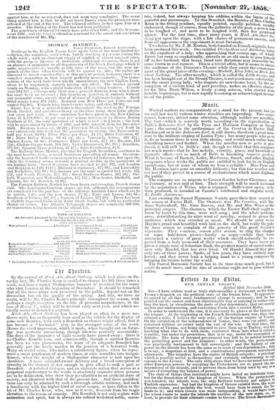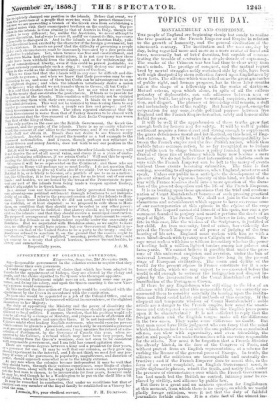Vitus In t4r etitnr.
OUR IONIAN POLICY.
Belfast 19th Ye rent bar 1858. Sin—I have seldom read so truly statesmanlike a document as Sir John Young's despatch on the political state of the Ionian Isles. It appears to be agreed by all that some fundamental change is necessary, and he has pointed out the easiest and least objectionable way of untying or rather cut- ting the knot, by abandoning the parts of that dependency, that are merely useless and embarrassing, and converting Corfu into a second Malta. ,
In order to understand the case, it is necessary to glance at the history ot the islands. At the beginning of the French Revolutionary war, they con- stituted a relic, I believe the only relic, of the foreign empire of -I( emce. On the extinction of the independence of Venice, they were cut adrift, and remained without an owner until the end of the win% At that time, the Congress of Vienna, not being disposed to give them up to Turkey, and not knowing what else to do with them, converted them into what is called s republic, but under the protection, that is to say, under the suzerainty of Britain. The form of internal government was left to be settled between the protecting power and the islanders: in other words, the protectorate was practically, tantamount to full sovereignty : and the history of our power in the islands has been the same as in most of our dependencies ; that is to say, a despotism at first, and a constitutional government introduced afterwards. The islanders have the rights of British subjects; a privilege which is possibly useful to themselves, and certainly embarrassing to our, consuls in the Levant. The only obligations that we have incurred towatos other European powers by accepting the Protectorate are to guard the ill dependence of the islands, and to 'prevent them from being used by any as a means of disturbing the balance of power. The state of things thus instituted might have lasted an indefinite time, but for the foundation of the kingdom of Greece. When the proteOtaate was founded, the islands were the only Hellenic territory not subject to Turkish oppression : but had the kingdom of Greece existed then, the most obvious course, and probably the beat, would have been to annex the Is- lands to it and when Greece was made independent, it would have been the wisest course to make the islands the nucleus of the new state, or,. at least, to provide for their ultimate cession to Greece. The Greek Revolution ro hpletely changed our positron in the islands. Before that event, we he roteetersof a people that were too weak to protect themselves; we° „P.e are preventing a branch of the Greek race from establishing a
with their emancipated brethren on the continent. Our po- olitic■ Ow islands is thus similar to that of Austria in Italy, though our
' vcry different; for, unlike the Austrians, We never attempt to diSCOLItelat, but always to cure it and if we cannot do this, our course i'feressnertIlv to disregard it. Anil in the 'islands 'as in Austrian Italy, poll- fisoil disc. (Intent is not excited by the character' of the foreign government, but by its existence.. • It needs no proof that the difficulty of governing a people ii-nder such circumstances niutit be immensely increased by a free press and as elective legislature. Yet, when Greece was free and constitutional, and 'when even Malta had elective institutions, it is not, easy to see how these e,m1d have been withheld' from the islands ; and as for withdrawing the gift of constitutional liberty, even if this could be proved justifiable, we ',',.lieet seriously contemplate such a step ; it would destroy our moral po- sition in the world as the disinterested advocates of freedom. When we thus find that the islands 'will in any ease be difficult and dis- n,reeable to govern ; and when we know that their possession May be em- gorassing to us, and none of them but Corfu Can be advantageous to us in the slightest degree ; and When the islanders notoriously desire a union with Greece ; why should we not transfer them to Greece, all but Corfu ? It is said that treaties stand in the way. Let us see what we are bound to by the treaty that constitutes the protectorate. It binds us to provide for the prat( ction of the islands. This condition will certainly not be violated by transferring them with their own consent. It binds us to provide for their administration. This will not be violated by transferring them to any regular government under which a people can live and prosper : and the Greek Government is such a one. The often repeated .statement that the finek Government is worse than that of Turkey deserves to be classed with the statement that the Government of the ,East India Company was worse than that of the King of Gude.
The only parties in the case are the British Government, the Greek Go- vernment, and the people: of the islands. There is no necessity whatever to ask the consent of our allies to the transaction; and if we ask it we cer- tainly shall not obtain it. Russia does not desire to nee Greece really tiengtheued. .Austria would regard the trander as a bad exat»ple to the oppressed nationalities. And Prance, though perhaps not reluctant to benefit Greece and annoy Austria, does not wish to see our position in tho Levant improved... But, it will be said, suppose we surrender the other islands to Greece ; will it nut deprive the act of all moral value, and stamp it as a piece of undis- guised calculating selfishness, if we retain Corfu ? Will not this be openly treating the liberties of a people to suit our own convenience ? Of course it will be so represented on the Continent : and those who are trampling on Rome will perhaps say so most loudly. 1 do not question that it would be desirable to give up Corfu also if we could : but we cannot do so. Not that it is, or is likely to beeome, of a particle of use to us as a nation : but, like Gibraltar, it is too important a post for us to trust out of our own hands : and besides, we are bound by the terms of the Protectorate to pre- sent any part of the islands from being made a weapon against Turkey, which Corfu might be in Greek hands. In a similar case our Government was lately prevented from making a very advantageous political settlement through reluctance to act indepen- dently of an ally. I refer to the proposed cession of the Bay Islands to Hon- duras. These were islands which we did not need, and to which our title I was doubtful, or at least disputed : so we proposed to cede them to Hon-
! duras, on condition that they should never be ceded to any other power : did they should never be fortified : that slavery should not be permitted to exist cm the islands: and that they should receive a municipal constitution. The proposed arrangement would have been nearly tantamount to consti- tuting the Bay Islands as an independent republic under the suzerainty of Honduras. Had we negotiated with Honduras alone, as we ought to have doe, no difficulty would have arisen : but our Government thought it ne- cessary to ask that of the Eilited States to be a party to the treaty : and the Americans refused to sanction it, on the ground that the cession ought to be " absolute' " instead of "qualified," ineanit'er, probably, that they could not consent to a treaty that placed barriers; however inconsiderable, to slavery and annexation.



























 Previous page
Previous page